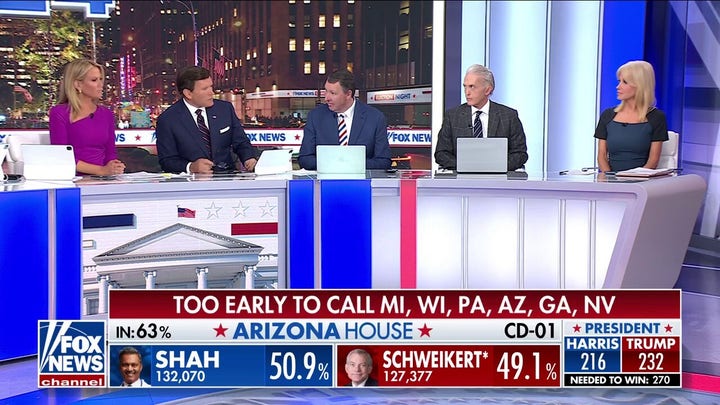DAVID MARCUS: Trump’s big win means Republicans have a real shot at generational power. Don’t screw it up

It wasn’t supposed to be like this.
Pollsters and pundits promised that the 2024 presidential election between Vice President Kamala Harris and, now, President-elect Donald Trump would be a nail-biter. But in the end, it was a blowout, and it opens the door for Republicans to grasp generational power.
Since 1994, when Americans signed up for the GOP’s Contract with America and ended four decades of Democratic control of the House of Representatives, our country has not had a truly dominant political party.
It has been a 50/50 society since then politically, with neither side able to maintain long enough simultaneous control of Congress, the presidency and the courts to enact the kind of sweeping change that Franklin D. Roosevelt achieved in the 1930s and which Lyndon B. Johnson did in the 1960s.
FDR’s alphabet soup of federal agencies and LBJ’s welfare state are still with us; they have this permanence precisely because they were enshrined during prolonged periods of Democratic Party power. Today, it could finally be time for Republicans to return the favor.
The biggest takeaway from Trump’s – pollster humiliating – win is not how much he won by, but who he won with.
Exit polls tell us that Trump won an astounding 46% of the Hispanic vote, an eye-popping 35% of Black men in Texas, and won first-time voters, who he lost badly to President Joe Biden in 2020, owing to growing support among Gen Z men in their 20s.
As Biden is so fond of saying, 'this is not your grandfather’s Republican Party.'
Even suburban White women, supposedly his Achilles heel, broke for Trump, which is nice because now they won’t have to lie to their husbands about their vote, as Democrats implied cowed women across America would.
Since the beginning of his political rise, four issues have animated Trump’s populist GOP: a strong border, energy independence, anti-globalism and fighting the culture war.
All four are issues with majority support in the country, and if Trump, working with a GOP Congress, prioritizes the core four new right principles, there is reason to think voters will continue to reward them with a growing and increasingly diverse coalition.
When you add to this a conservative 6-3 majority in the Supreme Court, one that Trump could solidify should either Justices Clarence Thomas or Samuel Alito retire, you have all the tools needed to deconstruct our broken deep state bureaucracy.
Obviously, the major obstacle to generational GOP power is the Democrats, but in the wake of Harris’ humiliating defeat, the party is in shambles, and worse, has an increasingly fractured coalition.
Make no mistake, Harris lost this election, in large part, because she refused to take clear positions on major issues, but how could she when Democrats themselves are divided on so many of them, like Israel vs Hamas, fracking vs environmentalism, men playing in women’s sports vs basic sanity?
The problem was not so much that Democrats didn’t tell us who Harris is, it was that they never actually decided who they wanted her to be.
Now, I am old enough to remember, after President Barack Obama was elected in 2008, the oceans of ink spilled in endless thinkpieces about how Republicans would never win again, essentially, the liberal version of this very column you're reading.
In Obama’s case, specifically in his second term, he and his party lurched so far left that he alienated the very core Democratic voters, such as the White working class, who would then elect Trump, and that is a warning for Republicans.
Trump and the GOP must avoid the kinds of bait and switch we saw with Obama, who, for example, went from lying about opposing gay marriage based on his deep Christian beliefs to 'evolving' on his position.
If the Republican Party can stick to the four key platform items that broadened their coalition, if they can start to secure the border, bring jobs home, lower gas prices, as well as stand up for biological reality and a colorblind society, this new GOP can hold together.
Since the beginning of his political rise, four issues have animated Trump’s populist GOP: a strong border, energy independence, anti-globalism and fighting the culture war.
Donald Trump will never run for president again, but in four years some Republican will, and whether it is Vice President-elect JD Vance, Gov. Ron DeSantis, or anyone else, Trump has the chance to hand them the keys to a party with the power to fundamentally change America for the better.
This is a golden chance for the Republican Party, the kind that doesn’t come around very often. We will soon find out if they can keep it.

